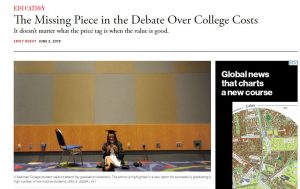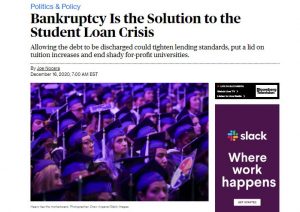In a new episode of Capitalisn’t, Luigi Zingales and Bethany McLean take a look at the student debt crisis: How did we get here? Is for-profit education to blame? And can we come up with a solution?
In this episode of Capitalisn’t, Luigi and I explore the vexing question of student loan debt, which is back in the headlines due to talk that the Biden Administration will, with a wave of the magic taxpayer wand, wipe out $10,000 to $50,000 of it per borrower. (This is actually Sen. Elizabeth Warren’s plan.)
There are interesting analogies between the student loan crisis (and it is a crisis) and the housing crisis that led to the 2008 financial meltdown. One is that the roots of the problem go back decades, with the implementation of a system that allowed “private” companies to profit at taxpayers’ expense. I first wrote about this in a 2005 piece for Fortune. (Forgive the old school formatting!) In part for the same reason, for profit education started to expand as well—why not lure students into paying for useless degrees when you can do so with federal funds?
Ok, ok. That’s not entirely fair. For a long time, one of the biggest fights between bulls and bears in the stock market was for-profit education. There was a case to be made that the for-profit schools were providing an opportunity to students who otherwise wouldn’t have a shot at an education. Nor is the problem limited to for-profit schools. This Atlantic story hits the proverbial nail on the head.
Today, as Constantine Yannelis tells us in this episode, the default data shows that for-profit education is too often a problem, not a solution. It’s part of a broken system, in which the spiraling cost of an education doesn’t deliver the financial results that might justify it. I worry that the disillusionment resulting from that might contribute to broader fraying of our trust in the American way. We were all told to stretch ourselves to buy houses, because that’s what you do to have a better life. We were all told to stretch ourselves to get a college education, because that’s what you do to have a better life. If neither are true, and people are left to pick up the pieces while corporations benefit, that’s a problem that goes well beyond money.
What’s the solution? My longtime writing partner Joe Nocera argues that allowing student loan debt to be discharged in bankruptcy would tighten lending standards.
Maybe. Frankly, the weakest part of the podcast is where Luigi and I tried to come up with a solution! Twelve years after the financial crisis, we still haven’t answered the question of how to finance housing. Can we do better with the even more important question of how to finance education?









